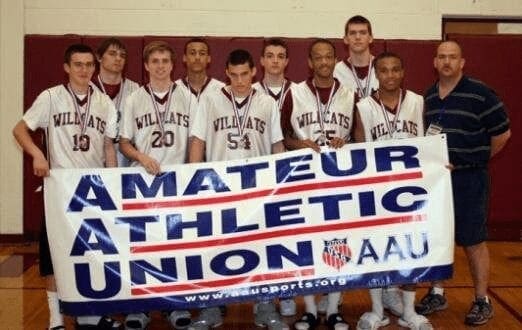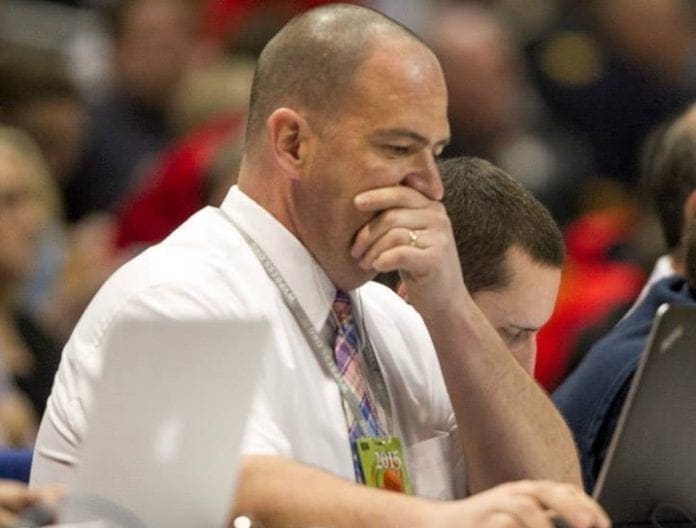Rich Stevens built himself into one of the top sports journalists in West Virginia during a 25-year career that began in Wheeling back in 1989. Rising through the ranks, Stevens learned under the tutelage of Doug Huff, who molded him on his way to being named Sports Editor of The Intelligencer.
Stevens could get any story because there was no question he was afraid to ask, whether to collegiate coaches down to prep athletes. If someone missed a key shot in a big game, he asked about it when most high school sportswriters shy away from such questions.
He led his newsroom by example, not letting his staff outwork him and never asking his writers to cover something he, himself, refused to cover. He was respected around the state, both as a writer and for his opinion, which, he admits, he offers freely whether requested or not.
His talents eventually took him to the state’s largest news market in Charleston, where he worked for the Daily Mail for 13 years, including as assistant sports editor from 2011-15. It was a great position, but Stevens could see the writing on the wall as years later the West Virginia Gazette purchased and merged with the Daily Mail.
Career Change
So despite 20-plus successful years in his field, Stevens decided it’s never too late to make a change. He enrolled at West Virginia State to finish his communications degree before heading to Marshall to obtain his teaching degree. The merger of the two papers was timed perfectly for Stevens as he opted to take a severance package and use that money to cover expenses while he completed his semester of student teaching.
A sports scribe never truly gives up the passion though, and Stevens is no exception. While he serves as a teacher and coach at Valley High School in Fayette County, he still manages the West Virginia Sports Writers Association’s website and has since its inception.
Success in two career fields at different stages in your life is something to be proud of. But in the end, are they all that different? After all, you’re taking something you witness, or learned in the case of an educator, and finding the best and easiest way to tell it to an audience.

After you made the move to Charleston, how long was it until you decided to go back to school to get your teaching degree, and what brought about the move?
When I moved to Charleston, I still had to complete my communications degree, which was first on the list at West Virginia State. Then I went to Marshall Graduate College to get my teaching degree. The only subject in class with which I had success was English, and I grew tired of seeing our young people speaking incorrectly, not using correct grammar and punctuation, especially with social media. I decided I wanted to be part of fixing it. When the Daily Mail and Gazette merged, I opted not to try to remain. I accepted the severance offer and took six months off to complete my student teaching, and here I am.
Being a sports reporter takes a dedication beyond the normal 40-hour work week. How did you manage to juggle that, being with your family, and then college on top of it?
Being a sportswriter is a 40-plus hour-a-week job, but it also can be flexible. If you ask any sportswriter who has been in it for a while if they can just drop it, the answer is typically an emphatic “no.” I was always told that I’ll die sitting at a typewriter. Of course now it’s a laptop, but that’s probably true. I guess it’s like an addiction. I don’t know how I juggled it. I coached my son and daughter from a young age in youth basketball and even coached my son in AAU. You don’t really think about it at the time. You just do it and it works out.

You’ve always been an opinionated person. How has that helped you in your transition to the classroom, and does it make it easier to stand up and talk for 5-7 periods a day?
I’m very opinionated, which turns some people off. I tell my wife, “I apologize for nothing.” I learned a long time ago that most people appreciate honesty. I always have been known for asking tough questions, even with high school athletes. Just like basketball, I’m playing the percentages. The higher percentage of people appreciate my candor, and I have gained some level of respect because of it. If more appreciate it than don’t, I can live with that. Being their friend isn’t nearly as important as writing the facts and earning respect.
These appear two different careers on the surface, but ultimately, you’re finding the best and easiest way to relay important information so that others can understand what you’ve seen/learned. Are they both equally rewarding and in what ways individually?
Quite frankly, I feel rewarded more as a teacher because students look forward to my saying “hi,” or giving them a high five than if I teach them the difference between a noun and a verb. As for WVSWA.org, that is my pride and joy. I take a tremendous amount of pride being a life member of the West Virginia Sports Writers Association. The website has been the brainchild of Doug Huff for years, and I just happened to be the one to run with it. Doug and I have a great relationship. He’s my mentor and responsible for almost everything I have done in the business. Without him, I’m not doing this interview. I have always struggled with certain aspects of writing, like making the reader feel like he/she is there. As a teacher, I have a type A personality. It’s much easier conveying information as a teacher because I can use eye contact and hand gestures. The kids think it’s funny sometimes, but that’s OK. It means they’re paying attention.
You still work for the WVSWA managing its new website, and I believe you’ve coached a bit too (If I’m wrong, I can take this out). Has it been hard to separate yourself completely from journalism? Does staying involved in this capacity allow you to still scratch the itch when needed?
I helped coach the Valley varsity boys team with head coach Joe McCoy and assistant coach Gordie Mitchell from 2016-19. You haven’t lived until you coached at a Class A school in rural West Virginia. Perhaps my greatest moment was walking onto the Civic Center floor in 2017 as a member of Valley’s state tournament “support staff,” and sitting on the opposite side of the floor than I did for more than 15 years. That was neat. I never have had an issue with being objective. I’m that way with my kids, students, and I was with the team. If you’re not honest with people, you’re cheating them, even when they don’t like what you have to say. I’ve had players ask me to add a rebound here, or an assist there, to give them a double-double, or a triple-double. They don’t get angry when I don’t. If I did, what am I teaching them? They get it.
In addition to the West Virginia Sports Writers Association website, I’m writing a book, so I guess I have evolved somewhat. Unfortunately, I have not found a way to write the book without it reading like a ridiculously lengthy newspaper story. For several years, I also helped the West Virginia Golf Association with the State Open and Amateur championships, the Mountain East Conference tournament, and Regional Sports Network (RSN) for several years. I’ve also participated in football pregame shows online with Carl Lee (former Minnesota Vikings’ all-pro). Those kinds of things keep me close to sports. My wife, Cathy, has been incredibly supportive with everything I have done and am doing, and I am forever indebted for that.


